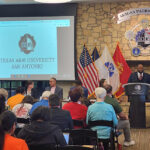
By Yesenia Camacho and Amanda Aguilar
The University’s Veteran Certification Office is growing steadily and is expected to expand to serve the veteran population at Texas A&M-San Antonio.
Staff members are proud of the part Texas A&M-San Antonio has played in serving a growing veteran population.
TAMU-SA’s Veterans Benefits Coordinator Trisha N. Ruiz says that since fall 2009, the number of veterans enrolled in the Texas A&M University System has grown 112 percent.
Staff members, who are analyzing and predicting growth in the department, are also looking internally to assess what techniques are contributing to growth and program success.
Barrett Breaux, chief of military community relations, came on board two years ago from Texas A&M University-Corpus Christi. A combat veteran of Iraq, he says he understands the experience of making the transition from combat to school.
After arriving at Texas A&M-San Antonio, Breaux said he realized that University president Dr. Maria Hernandez Ferrier was both serious and passionate about making sure the University was not just military friendly, but focused on being military embracing.
“We have the right leadership in charge right now that are military embracing. Our mission is to embrace the military environment and atmosphere for all military members as well as all families that are within the veteran/military community,” Breaux said.
Creating that culture, Breaux explained, helps veterans feel comfortable seeking out the resources they need.
“We can’t force [veterans] to come and see us,” Breaux said. But the departments, staffed with young veterans and experienced administrators, offer personalized service that is said to help veterans get the services and referrals they need, plus finish school successfully.
Richard Delgado, military community and veteran support officer, explained that his prior military experience is key to reaching veteran students. His military experience, he said, allows him to connect in a deeper level with the students, because he understands what they are going through.
But it’s more than the connection between staff and students that convinces prospective military veterans that Texas A&M University-San Antonio is the right educational institution for them. Breaux and Ruiz point to efficacy and good communication as important program-building tools.
“The strongest aspect of our Veteran Affairs program is the dedication that we have to servicing our students. We make sure that everyday we strive to speed up our certification process, broaden up our communication with them and strengthen the relationship that we have with our students,” Ruiz explained.
University students speak of the ease of transferring and the services provided.
“I have dealt with other veteran’s departments and it’s a lot easier at this one. The one exception was having to provide college credits I earned while in the military. This was the only school that I had to do that with and it was a pain, but over all, it has been a lot easier to get things done here,” said Nick Kelly, a military veteran and TAMU-SA student.
When compared to other universities, TAMU-SA’s veteran affairs program currently holds a low ratio between staff and students, which yields the way to a higher quality of customer service.
According to Ruiz, the Office of Military and Veteran Affairs has two staff members for every 300 students; the University of Texas at San Antonio has three staff members for 1800 students; Texas A&M University-Kingsville has one staff member for 300 students; and the University of Texas at Austin has two staff members for 1,000 veteran students.
“Because we still have that low ratio, they’re going to get a lot better customer service here,” Ruiz said. “….you can think of it like a private school quality but for a cheaper price. When the ratio does increase, we will add more staff no doubt,” Ruiz said.
And when it does, Veteran Affairs staff say that the growth of military relations on campus will be a unique asset that will put Texas A&M University-San Antonio on the map, not only locally, but across the U.S.
Stefanie Gutierrez contributed to this report.






